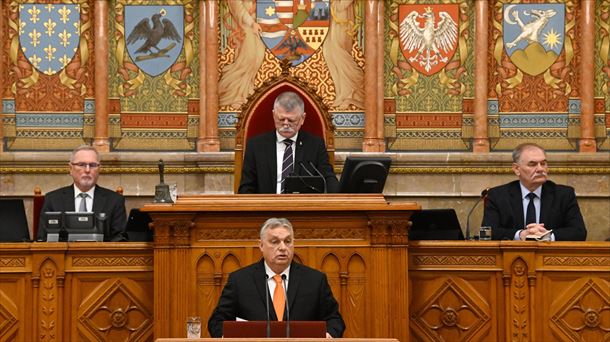Today’s parliamentary election could make far-right candidate Georgia Meloni the first woman to lead the nation
After an unusual campaign in the middle of summer and a day of ‘silenzio elettorale’, the fancy term used to call the day of reflection in the country, 51 million Italians will be called to the polls this Sunday in parliamentary elections that could make Giorgia Meloni, candidate of the far-right Fratelli d’Italia (FdI, Brothers of Italy) party, the first woman to lead the government of a nation where machismo is still very much alive. It would undoubtedly be a success for her, far from feminist proclamations, and also for her political strength, which remained at 4% of the vote in the previous election, held in 2018. So it would show that it is no longer just the voting option of those nostalgic for fascism, where FdI has its roots, and that its strategy of becoming an attractive alternative to conservative voters has been successful.
Meloni’s foreseeable victory is partly explained by his consistency: he has so thwarted all the governments of the previous legislature that he was the sole opposition to exercise the outgoing executive of Mario Draghi, who was supported by a very broad coalition of parties, which they ranged from extreme left to extreme right. The dissolution of that alliance in July last year caused the end of the executive branch led by Draghi and the calling of snap elections, putting Meloni on the stage for his rise to power. It would be the culmination of a political career that began in adolescence and that led her to be the youngest minister of Italian democracy, dealing with youth policy between 2008 and 2011.
If what the polls predicted two weeks ago is fulfilled, as the publication has since been banned, Meloni would gain an absolute majority along with the other members of the conservative coalition, the League of Matteo Salvini and Forza Italia (FI), Silvio’s party. Berlusconi, who is celebrating his 86th birthday this Thursday with another electoral success, yes, now as a junior member of the right-wing bloc. While he assured throughout the campaign that FI’s presence in a possible conservative government would ensure that Italy would not turn its back on NATO or the EU, his latest statements on Ukraine confirm that Russia intended to replace the current leader of the Kiev, Volódimir Zelensky, by an Executive “of decent people”, may have a prize in the polls.
Besides the unknown who will be the leader of the next Italian Executive, there is the certainty that his task will not be easy. He will take the reins of an aging country, with a demographic curve that is collapsing sharply, meaning that by 2050 the quota of citizens of working age will be halved and there will be five million fewer inhabitants. The economic situation is also rocking, with government debt exceeding 150% of GDP, one of the highest levels of developed countries. The rise in the money price will push Italy to pay more interest and will make life more difficult when it comes to financing businesses and households, already suffering the effects of the energy crisis and inflation, which reached 8.4% in August . “The situation is difficult, let’s not kid ourselves,” he repeated several times during the Meloni campaign, trying to give his followers a reality check.
“The first thing the next government will have to do is guarantee gas supplies for the winter. If we got into an emergency, that would be all that could change everything,” said Eugenio Pizzimenti, a professor of political science at the University of Pisa. The gas issue is crucial for Italy: it produces much of its electricity from this hydrocarbon, which it imported mainly from Russia until that country’s president, Vladimir Putin, ordered the invasion of Ukraine last February. Since then, it has cut gas purchases from Moscow to 18% (they were 40% in 2021), though it won’t be able to do without it completely until the second half of 2024.
Another major challenge facing the next head of government is that of perpetual political instability in Italy, a country where cabinets last an average of just over 13 months. If the right-wing coalition wins two-thirds of the seats, it could launch the constitutional reform that Meloni aspires to establish a semi-presidential republican regime, similar to the one existing in France, thus reducing parliament’s influence and stability. to get. However, Pizzimenti believes that if the FdI candidate finally came to power “she wouldn’t talk much about this reform, at least at first, because it’s a risky issue that could wear her out.” Nor does he believe there will be major swings in Ukraine’s support for the war or in its position in the European Union.
This political scientist from the University of Pisa asks not to forget that “the latitude that European governments have today is limited, because many decisions are made in Brussels. Whichever Executive comes out of the elections, there will be some discontinuity measures, but I don’t think there will be any major changes.” There will also always be the figure of the President of the Republic, Sergio Mattarella, to whom the Italian Constitution is a important role as a guarantor and who has shown ample responsibility during the various political crises of recent years.
Source: La Verdad
I am an experienced and passionate journalist with a strong track record in news website reporting. I specialize in technology coverage, breaking stories on the latest developments and trends from around the world. Working for Today Times Live has given me the opportunity to write thought-provoking pieces that have caught the attention of many readers.



